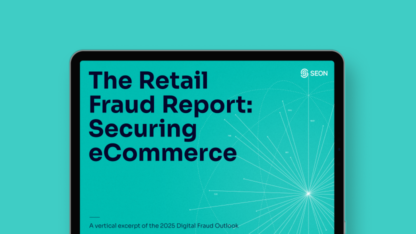Customer Due Diligence (CDD) is now a critical part of regulatory compliance and fraud prevention, especially as financial crime grows more complex. Businesses face rising pressure to verify customer identities and assess risk throughout the customer lifecycle.
In 2024 alone, fraud losses hit $12.5 billion—a 25% increase from the previous year—prompting 75% of companies to place CDD as a top compliance priority. This guide explores how fraudsters bypass KYC, common gaps in due diligence, and how alternative data can help detect suspicious activity.
What Is Customer Due Diligence?
Customer Due Diligence (CDD) is the process of verifying a customer’s identity and evaluating their risk profile before starting a business relationship. It plays a vital role in meeting Know Your Customer (KYC) and Anti-Money Laundering (AML) compliance requirements, particularly in financial services, banking, and fintech. CDD helps businesses prevent fraud, detect suspicious behavior, and comply with regulatory standards set by global authorities.
A thorough CDD process typically involves collecting and validating key customer data—such as full name, address, and official identification—screening against sanctions and watchlists, and analyzing public or private data to assess financial activity and risk exposure. The depth of due diligence varies based on the customer’s risk level; high-risk individuals or entities require more extensive checks and ongoing monitoring to ensure compliance and minimize exposure to financial crime.
Types of CDD
CDD procedures can be categorized into three levels—Simplified, Standard, and Enhanced Due Diligence (EDD)—based on the customer’s risk profile:
- Simplified Due Diligence (SDD): Applied to low-risk customers and involves minimal information checks.
- Standard Due Diligence: The baseline approach for most customers, focused on verifying identity and understanding basic financial background.
- Enhanced Due Diligence (EDD): Necessary for high-risk individuals (e.g., politically exposed persons or those in high-risk industries). This includes deeper investigations into the source of funds, business relationships, and ongoing transaction monitoring.
EDD provides an extra layer of protection for businesses dealing with elevated risk scenarios and ensures stronger compliance with regulatory expectations.
Why Is CDD Important?
Customer due diligence (CDD) is a legal requirement in many industries, especially for banks and For banks, fintech platforms, and financial service providers, strong CDD practices are essential. They help:
- Detect and prevent fraud, money laundering, and terrorist financing
- Stay compliant with AML laws and FATF guidelines
- Avoid significant penalties and reputational damage
By incorporating tools like identity verification, digital footprint analysis, and alternative data sources, businesses can more effectively manage risk while maintaining smooth onboarding and compliance workflows.
Customer Due Diligence Requirements
Customer due diligence (CDD) is essential for organizations like banks, fintech companies, and investment firms to manage risks and comply with regulations. Here are the four key requirements involved:
Customer Identification
When starting a business relationship or conducting significant transactions, organizations must verify a customer’s identity using official documents like passports or driver’s licenses. This ensures compliance with anti-money laundering (AML) regulations and helps flag high-risk individuals, such as those on PEP or sanctions lists.
Ongoing Monitoring
Regular customer reviews are essential for keeping records accurate and detecting potential fraud. These ongoing checks involve monitoring transaction history, reviewing updated personal information and identifying any discrepancies or unusual behavior that could signal a risk. By continuously validating customer data and activity, organizations can stay compliant with AML regulations and respond quickly to emerging threats.
Risk Profiling
Organizations assign each customer a risk level, typically categorized as low, medium or high, based on several factors, including transaction patterns, geographic location, source of funds and results from AML/CFT (Anti-Money Laundering and Countering the Financing of Terrorism) checks.
Even customers classified as low risk must still undergo identity verification and profiling. This ensures compliance with regulatory requirements and supports proactive risk management by helping businesses detect unusual activity early, monitor behavior over time and adapt due diligence efforts as needed.
Enhanced Due Diligence (EDD)
For high-risk customers or flagged activities, deeper checks are performed. This includes scrutinizing the source of funds, business relationships, and transaction history to mitigate potential risks and maintain compliance.
By following these steps, organizations can tailor their CDD efforts to customer risk levels while ensuring regulatory compliance and operational security.
Dive deeper into enhanced due diligence (EDD) and see how it differs from standard CDD. Learn why EDD is crucial for managing high-risk customers and ensuring compliance.
CDD vs EDD
Customer Due Diligence for Banks
Under AML and KYC regulations, banks are required to verify customer identity, address, and source of funds. Customer due diligence (CDD) helps prevent financial crime, ensures compliance, and supports effective risk management.
Banks use a risk-based approach to tailor CDD efforts based on a customer’s profile. High-risk individuals require Enhanced Due Diligence (EDD), including deeper background checks. CDD is an ongoing process involving continuous monitoring to detect and report suspicious activity—critical for maintaining compliance and protecting the financial system.
Discover best practices with our free guide to reduce onboarding risks and stay AML/KYC compliant.
Download guide
Steps to Perform Customer Due Diligence
Customer due diligence (CDD) is a legal requirement that applies to new business relationships, high-value transactions, money laundering suspicions, or cases involving unreliable documentation. Here’s how to carry it out effectively:
- Verify the customer’s identity: Confirm the customer’s identity using official documents and digital verification tools. This step is crucial for KYC compliance and helps ensure the person or business is legitimate.
- Assess financial and risk information: Review the customer’s financial background, source of funds, and business activity. High-risk customers may need deeper checks based on transaction value or potential red flags.
- Monitor and update customer records: Keep customer data up to date, especially after major changes like new ownership or business structure. Store CDD records securely and review them regularly for accuracy.
- Use technology for ongoing monitoring: Leverage tools like open banking APIs, email and device fingerprinting, and IP analysis to detect suspicious behavior and reduce risk. Continuous monitoring helps spot fraud early and stay AML compliant.
By combining traditional methods with modern technology, businesses can effectively manage risk, prevent financial crimes, and meet AML regulatory requirements.
Customer Due Diligence Solutions
Customer due diligence (CDD) solutions do more than meet regulatory requirements—they help businesses actively prevent fraud and financial crime. By using tools like IP analysis, digital footprint analysis, and pre-screening during onboarding, organizations can flag high-risk users early, especially those from restricted regions or showing suspicious behavior.
Advanced CDD platforms also automate ongoing screening against updated sanctions, PEPs, and financial crime lists. Real-time monitoring for adverse media and unusual transactions helps detect threats quickly without disrupting legitimate users. This allows businesses to scale confidently while maintaining strong compliance and risk controls.
Frequently Asked Questions
A due diligence checklist is a series of steps your organization must complete to ensure it remains legally compliant. The checklist steps may vary from one industry to the next, but they always include some form of identity and financial information verification.
Customer due diligence requirements vary from one industry to another, however, you will commonly find that a business must establish a user’s: 1) identity, 2) financial information, 3) residential address, 4) money-laundering risk.
Sources
- Thales Group: Annual Report Ebook
- Identity Force: What Are the Odds of Getting Your Identity Stolen?
- CNBC: 25% of households are either banked or unbanked








